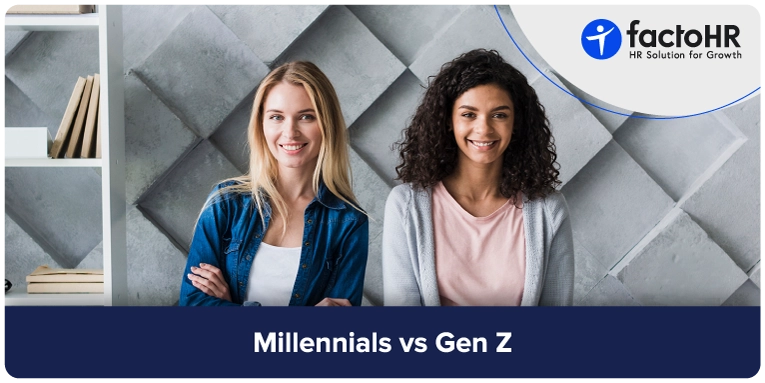Millennials vs Gen Z (Key Differences Explained)

Table of Contents
Key Takeaways
- Both generations are tech-driven and bring creative ideas to the workplace.
- Gen Z prefers job security and individual work, while Millennials value flexibility and teamwork.
- Millennials are motivated by growth and balance, while Gen Z seeks security and a strong sense of purpose at work.
- Millennials report higher workplace happiness, while Gen Z has higher resignation rates due to stress and imbalance.
- Organizations can retain them by improving communication, offering flexibility, and supporting continuous learning.
Millennials and Gen Z comprise a major proportion of today’s workforce, their expectations are already influencing how organizations operate. Their focus on meaningful work and modern tools requires HR teams to rethink policies and create work environments that support growth and well-being.
Differences Between Millennials and Gen Z
Millennials and Gen Z may belong to consecutive generations, but their work styles and priorities differ in many ways. Understanding the key differences between Millennials vs Gen Z helps HR teams create policies that suit both groups.
| Aspect | Gen Z | Millennials |
|---|---|---|
| Work Attitude | They prefer stability because many entered the workforce during the uncertain COVID-19 pandemic. This makes them cautious and focused on job security. | They value flexibility and are comfortable exploring new opportunities. Their approach to work is more relaxed and adaptable. |
| Working Preference | They are comfortable working independently because they grew up with more digital interactions and less in-person social exposure. | They enjoy teamwork and group discussions. They grew up socializing more and often perform better in collaborative settings. |
| Communication | Despite being digital natives, the meaning of Gen Z also reflects a preference for human connection. They value face-to-face conversations at work to counterbalance their constant online exposure. | They adopted digital communication early and still prefer email, chat, and other virtual tools for workplace discussions. |
| Motivation | They seek financial stability but are strongly driven by having a clear purpose and work that has real value. | They value growth, learning, and personal development. |
| Professionalism | They see professionalism as ethical behavior, reliability, and integrity, rather than traditional titles or formalities. | They are comfortable with conventional workplace norms, including hierarchical greetings and established etiquette. |
| Age Range | Typically born between the mid-1990s and 2010. | The Millennial age group includes those born between the early 1980s and the mid-1990s. |

Workplace Motivations for Millennials and Gen Z
There’s not much difference in goals and motivations in the workplace. Both these generations seek more than just money and stability in their careers.
A healthy work culture, job flexibility, delicate work-life balance, and personal growth are the most motivating factors for millennials.
On the other hand, incentives for Gen Z follow the same pattern, with a few more additions. This generation seeks profundity and personal meaning and strives to make a massive positive impact.
Which Generation is Happiest at Work and Who Quits the Most?
All generations have had their reasons for employment. While the early ones, like the Baby Boomers, had no choice but to toil for survival, the next generations saw a career as an instrument of growth and success. These factors affected their relationship with work a lot.
According to a Forbes survey, millennials are the happiest at work, with over 57% of the workforce approving this fact. This is mainly because this generation was the first to be backed by the power of the internet. So, they were able to infuse their pros into their professions early on and make them more effective yet comfortable.
Challenges Faced by Millennials and Gen Z in the Workplace
Like every other generation, both face challenges in the workplace. These setbacks adversely affect their day-to-day productivity and eventually cause them to withdraw from the organization.
While the older generation mostly struggles with a lack of flexibility, freedom, personal benefits, and pay, Gen Z has slightly different struggles. To them, issues like inability to express themselves, mental stress, work-life imbalance, and lack of job security and money are the reasons for resignations.

Best Ways to Engage and Retain Millennial and Gen Z Employees
There are several ways through which an organization can encourage healthy generational diversity to enhance business efficiency.
Maintain Core Values and Culture
Clear values and a stable culture are essential for the Millennials generation and Gen Z employees to feel connected to their work. To retain them, the organization’s employee management strategy must reflect its core values. This approach builds trust, guides teamwork, and supports retention.
Redesign Communication
Workflow efficiency depends on how well information is shared. Millennial and Gen Z employees respond better when communication aligns with their style. Balancing formal and informal communication through direct updates, quick digital channels, and clear guidelines prevents confusion.
Provide Work Flexibility
Unlike baby boomers, both these generations value flexibility to maintain a healthy work-life balance. Therefore, organizations should replace rigid schedules with flexible options such as remote or hybrid work, flexible hours, compressed weeks, flexible time off, and floating holidays. An HRMS supports this model by simplifying attendance, workflows, and collaboration.
Promote Continuous Learning
Millennials and Gen Z employees value growth and career development because they build confidence, improve teamwork, and help them keep pace with changing roles. Organizations commonly conduct regular employee surveys on desired skills and use skill gap analysis to plan targeted training programs, aligning with standard HR practices worldwide. Offer a range of programs and allow them to choose between self-paced, blended, or instructor-led formats.
Value Employee Feedback
Constructive, regular 360-degree feedback can help them strengthen their skills and stay engaged, thereby improving productivity. Using simple tools, such as an employee mood survey, provides early insight into concerns and strengths, making it easier to resolve issues before they escalate.
Adopt Intuitive Tech Tools
Millennial and Gen Z employees expect workplaces to use innovative, easy-to-use systems that improve their productivity. Offering an intuitive HR software solution with AI support helps them manage daily tasks, find information faster, schedule meetings, and stay connected across teams.

Conclusion
Both these generations comprise a massive chunk of the global workforce. These younger generations are tech-savvy and emotionally aware. They offer new skills and seek modern perks like flexible hours. Their job expectations differ from those of older generations.
Organizations need to adjust to make their workplaces better for younger employees. This is the only way to ensure future stability and prosperity.
Grow your business with factoHR today
Focus on the significant decision-making tasks, transfer all your common repetitive HR tasks to factoHR and see the things falling into their place.

© 2026 Copyright factoHR


